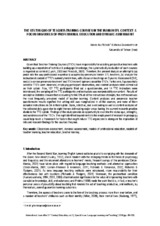Mostrar el registro sencillo del ítem
The status quo of teacher-training courses in the Iranian EFL context: a focus on models of professional education and dynamic assessment
| dc.contributor.author | Rezaee, Abbas Ali | |
| dc.contributor.author | Ghanbarpour, Mahsa | |
| dc.date.accessioned | 2018-11-22T11:02:23Z | |
| dc.date.available | 2018-11-22T11:02:23Z | |
| dc.date.issued | 2016 | |
| dc.identifier.issn | 2444-3921 | |
| dc.identifier.uri | http://hdl.handle.net/10396/17516 | |
| dc.description.abstract | Given that Teacher-Training Courses (TTC’s) have responsibility for assisting prospective teachers with building up a repertoire of technical & pedagogic knowledge, the systematically evaluation of such courses is regarded as seminal (Lynch, 2003 and Peacock, 2009). Therefore, the present study is an attempt to (a) probe into the way professional expertise is acquired by preservice Iranian EFL teachers, (b) analyze the instructional content of TTC’s currently held in Iran, with a focus on teachings on Dynamic Assessment (DA), and (c) examine preservice teachers’ and TTC trainers’ opinions about the TTC’s. To this end, 9 purposefully selected TTC’s were observed, employing participant observation, and content analyses were carried out on their syllabi. Also, 107 TTC participants filled out a questionnaire, and 14 TTC instructors were interviewed; the sampling of the TTC participants and instructors was nonprobability convenient. Results of descriptive statistics showed that accounting for 84.73% of all the instructional attempts, the craft model was the most frequently prevalent model of teacher learning. Content analyses and preservice teacher questionnaire results signified that writing skill was marginalized in all the courses, and none of them included instructions on DA in their syllabi. Open, selective, and axial coding as well as content analyses of the collected data gave rise to eight themes delineating major areas fueling the current research-practice divide in the TTC syllabi. Findings of the study provide an opportunity to examine the status quo, strengths, and weaknesses of the TTC’s. The eight identified impediments to the employment of research in pedagogy could help reach a framework for factors that might induce TTC organizers to disregard the implication of relevant research findings for the courses they run. | es_ES |
| dc.format.mimetype | application/pdf | es_ES |
| dc.language.iso | eng | es_ES |
| dc.publisher | Universidad de Córdoba, UCOPress | es_ES |
| dc.rights | https://creativecommons.org/licenses/by-nc-nd/4.0/ | es_ES |
| dc.source | International Journal for 21st Century Education 3(Special), 89-120 (2016) | es_ES |
| dc.subject | Classroom assessment | es_ES |
| dc.subject | Dynamic assessment | es_ES |
| dc.subject | Models of professional education | es_ES |
| dc.subject | Models of teacher learning | es_ES |
| dc.subject | Teacher education | es_ES |
| dc.subject | Teacher-training | es_ES |
| dc.title | The status quo of teacher-training courses in the Iranian EFL context: a focus on models of professional education and dynamic assessment | es_ES |
| dc.type | info:eu-repo/semantics/article | es_ES |
| dc.relation.publisherversion | http://www.uco.es/ucopress/ojs/index.php/ij21ce/index | es_ES |
| dc.rights.accessRights | info:eu-repo/semantics/openAccess | es_ES |

